Joel Gretsch
never planned to become a sci-fi star, but somehow he keeps getting
pulled inexplicably in that direction. In a decade-plus career that
has spanned movies like The Legend of Bagger Vance, The Emperor’s
Club and National Treasure: Book of Secrets,
Gretsch has always been open to a wide
range of roles.
It was Steven
Spielberg who first saw Gretsch’s potential in genre productions –
first tapping him for a role in the film Minority Report and
then following it up with a splashy villain role in the miniseries
Taken.
These led to a
four-year run as the star of USA Network’s popular sci-fi drama
The 4400 – in which Gretsch played a federal agent in charge of
investigating thousands of humans who were abducted by aliens and
given odd new powers when they were returned to Earth en masse,
years after their abductions. The series touched on fascinating
themes and subjects like drug abuse, governmental corruption and
religious fanaticism – making some trenchant points on the world we
live in by looking through the prism of fantasy.
Still, Gretsch
has left himself open to non-genre roles, recently playing Angie
Harmon’s love interest on the series Women’s Murder Club and
doing a funny guest starring role on the popular cable drama Burn
Notice.
The 4400
creator Scott
Peters lured Gretsch back into the sci-fi fold. Gretsch’s latest
role has the potential to be his greatest. He plays Father John, a
freedom-fighting priest in the splashy ABC remake of the 1980s cult-fave
series V. The story of what happens when aliens make contact
with Earth, Gretsch plays an honest and giving man of the cloth who
comes to realize that the aliens are not the peaceful beings they
claim, eventually joining the resistance determined to save the
human race.
Less than a week
before the return of V, Gretsch was nice enough to take the
time to call us and discuss his new series and his career.
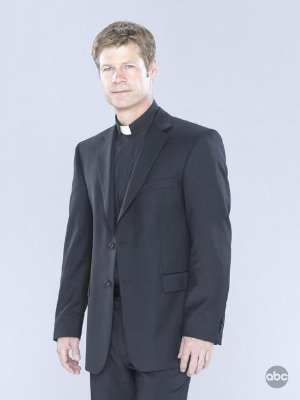 How
did you get started in acting?
How
did you get started in acting?
I saw a film a
long, long time ago. It was a night I couldn’t sleep. I was in
high school. The movie just moved me so much and I liked it. I got
fascinated by how they could make me feel the way that I did. Then
I went and saw a play in Minneapolis. I saw Death of a
Salesman. I sat in the theater going: God, this is amazing. I
was interested in how that occurred. How did somebody perform and
make me feel the way I did. I started studying. I took some acting
classes and went on from there.
A lot of your
more successful work has been in the Sci-Fi genre. Do your personal
tastes skew that way as well, or has that just been sort of a
coincidence?
A
coincidence. I think the first stuff that I did, stuff that I
really was passionate about like The Legend of Bagger Vance
or The Emperor’s Club – I loved those stories. I always felt
as an actor if I was so emotionally connected to the story, a part,
then I really could contribute. I always felt more confident going
into the meetings. I really feel like I can do something with
this. Then, it just went on with my career. I was doing
Taken with Spielberg – I loved the story. I loved the role. I
played a bad guy in it, so that was just a great part for
me. When we won an Emmy doing that with Spielberg, I thought, where
do you go from there when it comes to sci-fi? Then my agent sent me
a script for The 4400. I actually first said no. He goes,
“Just trust me. Just read it.” I thought it was really a great
character thing. My daughter was just born and the idea of
a TV series sounded pretty decent. (laughs) A
steady income. Then the show ended up being a really great ride for
four years. The creator of that was Scott Peters. Then he was
writing V after we ended. He said, “What are you
doing? There’s this part for Father Jack.” Scott Peters is one of
the great, great guys in the business. So I met with him and it
worked out in my favor to get the part.
Well you just
mentioned doing
Taken with
Spielberg. You also did Minority Report with him. What was
he like to work with and do you know how you got onto his radar?
Dreamworks did
The Legend of Bagger Vance and Spielberg from what I
understand watches the dailies of every project Dreamworks is
doing. He’s one of those guys – him and Jeffrey Katzenberg – that is just watching everything. They are very
much in tune with what is going on with everything that they are
working. Steven said to me on the set of Minority
Report, “When I was watching the dailies, I knew that
we would work together some time.” I was so flattered, considering
who he is and being such a huge fan of his work. Then he said, “You
know, there’s this miniseries I think you’d be wonderful in.” So it
just worked out. I remember the first day on Minority
Report, there’s three actors. We’re all on the set. I remember
going to the set, going, oh my gosh, Steven Spielberg. Steven
Spielberg! We get to the set and he started talking about the
scene. His enthusiasm about what the scene was about and doing the
scene – he was like a kid. And such a peer. He doesn’t make
anybody feel any different than you are. We are just here to create
the best possible storytelling. I found that to be true to most of
the successful people that I’ve worked with. Robert Redford was
like that [making The Legend of Bagger Vance]. Just being
onboard was like… we’re going to tell a great story here. And we’re
all going to do it together. It was terrific. It could not have
been better, to be honest with you. It was really one of the
highlights of my career.
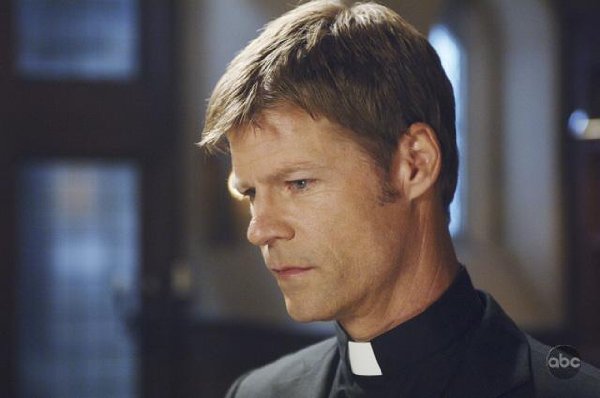 You
are mostly known for TV work, but you’ve done a lot of good movies
as well – like
Minority
Report, The Legend of Bagger Vance, even National Treasure:
Book of Secrets more recently. Do you have any preference? How
is working in TV different than film?
You
are mostly known for TV work, but you’ve done a lot of good movies
as well – like
Minority
Report, The Legend of Bagger Vance, even National Treasure:
Book of Secrets more recently. Do you have any preference? How
is working in TV different than film?
The main
thing, from a creative standpoint, is when you do a film, you read
the script and see the beginning, middle and end of your character.
There is a beginning to an end, so you can plot your way
through from your character’s standpoint. On television, you’re
getting the next script and you don’t know where you’re going. You
can sit down with the writers or the show runner and sort of get an
idea where they are going, but they are breaking the scripts only a
couple of scripts ahead. So, you don’t know. That can be a good
thing or a bad thing. In some ways you want to know. Because, wait
a second, if I knew that this person was my brother (laughs)
I would have played it differently two episodes ago. Yet, in some
ways it’s nice not knowing. From the standpoint of an actor
with a family: two kids and my wife, it’s nice that television goes
on for a while. Hopefully we can do a series for a long time. I’m
hoping that way for V, because it’s a joy to work on. It’s
nice to have stability in this business.
I’ve got to
say I was a huge fan of
The 4400 –
which lasted for four years.
What was that like to be involved in and how did you get into it? I
know you said earlier working with Scott [Peters], but how exactly
did that come about?
You know,
pretty basic. I got the script from my agent. I read it. I liked
it. Went in for the meeting and then met with people over at the
USA Network and got the part. It’s such a ride as an actor, because
you really don’t know. Sometimes you are going for a pilot. In
this business – first of all it’s hard to get a pilot, then you get
a pilot and you don’t know if it’s going to go. If it goes, just to
get past the first season…. It’s a very small percentage that gets
to go on like that. The 4400 was a great job to sink your
teeth in. To do a show for four years, you got to find a balance
really fast with your personal life and work – because it’s
all-consuming when you’re doing a series. But it was great.
Fortunately enough, I’ve been working with really great people. For
The 4400, I got to work with Jacqueline McKenzie, who is just
delightful and smart as a whip and a great person to be with every
day. Now with V, I’ve been around long enough to know that
when some things go well, you really appreciate it. I really
appreciate this show. Elizabeth Mitchell is about as delightful as
any actor I’ve ever been around. And I can say that pretty much
about everybody. Plus, we are telling V – a series that came
from the 80s that had a great following and now we’re piggybacking
that into this re-imagined version. Things are looking pretty good
for us. I hope we air next Tuesday and it airs well.
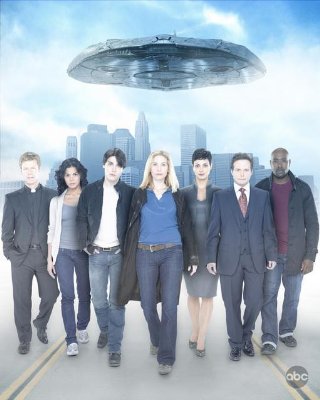 Were
you familiar with the original series
V
before getting this job?
Were
you familiar with the original series
V
before getting this job?
Some of it. I
think it was always… I knew some of it, I remember seeing some stuff
about like when the baby was born and it freaked me out. I
didn’t watch the whole thing, but I was definitely aware of it.
Have you seen
any of it since then, or are you avoiding it to keep the new one
fresh from the older one?
I YouTube it
every once in a while. In the beginning when I first got it, I
did. Thank goodness for YouTube out there – you can do this stuff.
But they were telling a whole different thing. Post 9/11
the world has changed. CGI and technical stuff we have at our
availability has changed. But, no, I didn’t watch a lot of it. I
totally appreciate it, though.
What are some
of the interesting challenges of playing a priest?
I think the
main thing, besides being just a priest, is that Father Jack is
really well-intended. He’s really – from the standpoint of why
somebody does become a priest – you do it for the intention of
really helping someone. Helping people, spiritual guidance or
relationship to their higher power. I think Father Jack definitely
brings out the best part of me, the guy playing it. He thinks twice
before he’s going to hurt somebody. (laughs) He’s a good
man. He’s the moral compass of the show, to a certain degree. He
definitely stands for what is right and wrong… and wanting to do
what’s right. He’s fallible. He’s a man, he makes mistakes. He’s
a real rounded person, he’s not just this imagination of what a
priest is supposed to be like. Jack is well-intended, but he’s a
man. He makes mistakes and he has a past. He screws up, but he
definitely wants to do the best and right thing.
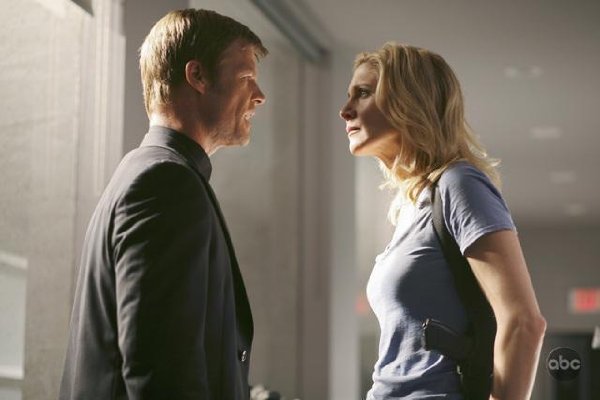 You
mentioned earlier it was fun playing a bad guy in
Taken.
About a year or so ago I interviewed Megalyn Echikunwoke [who played
The 4400 villain Isabelle Tyler] and she said it was
much more fun to play the bad guy. As someone who has played both,
what do you think?
You
mentioned earlier it was fun playing a bad guy in
Taken.
About a year or so ago I interviewed Megalyn Echikunwoke [who played
The 4400 villain Isabelle Tyler] and she said it was
much more fun to play the bad guy. As someone who has played both,
what do you think?
I think every
actor loves to play the bad guy. It’s like you can do no wrong. It
skews the boundaries. You get to play the little mischievous bad
boy. (laughs) It’s fun, to a degree. It just seems there’s
less restriction a lot of times.
The 4400
did have a pretty definitive ending in certain ways, but there were
other things left open. Were they always planning on finishing up
at the end of the fourth year or were there some rumors flying
around the set about what might happen in a potential fifth season?
I don’t know
if there were new storylines to go on, but I think it just came down
to the ratings. If we would have ended still strong at the end, we
would have came back. I just think that we lost our fan base. It
just petered out that way.
As you
mentioned, Scott Peters created both
The 4400
and now V. Did the working relationship with him the first
time around make V a more attractive scenario to you?
Totally.
Absolutely. I know what Scott is capable of doing and I knew he was
going to write something that was very fascinating. Not something
one-dimensional. He’s a very passionate man, Scott Peters. So, I
knew going into it that it was going to be a good show. I also knew
that the pilot was directed by Yves Simoneau. Yves Simoneau
directed the pilot of The 4400. I knew how talented he was…
or is. I knew going into it – I actually said this to another
actor, the last time we met with the studio at network, I said this
show is going to go. These two are just too good. Plus, we have
V. It’s a franchise. It was a successful show in the 80s. So,
we had a lot going in our favor.
On the other
hand, the storyline of
V
is
somewhat similar to that of
The 4400.
Were you afraid you may get pigeonholed as an actor?
(sighs)
Yeah, you’re pigeon-holed until you get the next job. I don’t… you
know, it’s not Diff’rent Strokes. (laughs) Or, I shouldn’t
say that… any show. I think V being a drama and before I was
an FBI – or NTAC – agent, now I’m playing a priest. But, you never
can control what [happens]. I remember doing Taken, playing
the bad guy. Then I got The 4400 and then after that I went
on a meeting and somebody said, “Yeah, I don’t think he can play a
bad guy.” Then the casting director said, “Did you see him in
Taken? He was about as bad a guy as I’ve ever seen.”
(laughs again) People forget fast, but you have no control over
that. You just show up and try to do the best work you can.
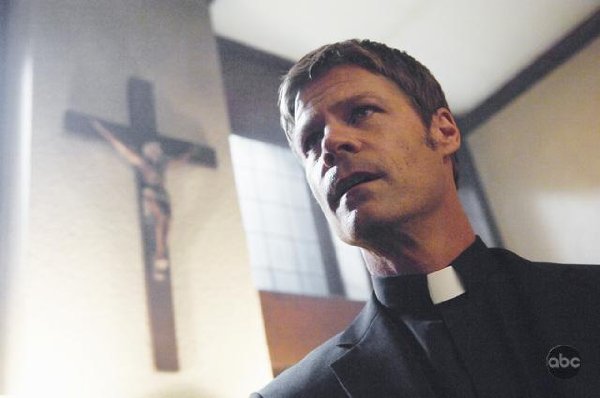 I
was also a fan of your series
Women’s Murder
Club
a couple of years ago – in fact I also interviewed Aubrey Dollar
from the show – and was surprised it never got a real shot after the
writer’s strike. Were you surprised when the show was cancelled?
I
was also a fan of your series
Women’s Murder
Club
a couple of years ago – in fact I also interviewed Aubrey Dollar
from the show – and was surprised it never got a real shot after the
writer’s strike. Were you surprised when the show was cancelled?
Yeah, I don’t
know. I think the timing of that show might have hurt it – being
around the writer’s strike. Angie Harmon is a very talented
actress. But that’s the business. There’s really no rhyme or
reason why some things stay and some things don’t. Sometimes shows
will start out not so great in the ratings and they hang with it and
it builds up to a huge success. I think you have to find your legs
as a new show. You have to find your way. I know that we’ve done
that. Like every show, you find that the writers are getting used
to you, you’re getting used to the writers. The studio and network
is trying to figure out all this stuff. It’s a very complex
business. It’s a very competitive business out there right now. As
for Woman’s Murder Club, it was a great premise, a great
group of people.
I’m also a big
fan of
Burn Notice.
Was that a fun show to guest on?
Oh it was.
Jeffrey Donovan is a hoot.
Yeah, he is.
I interviewed him recently, too…
He’s a
character. And a good golfer, by the way… He’s a good guy. He’s
one of the good guys out there. It’s a good show. USA has found
their little niche with their way of telling stories. That
is definitely a great show, and I think a lot of it falls on the
shoulders of the success for Jeffrey and the rest of the cast. They
do a beautiful job on the show.
Last I saw on
V,
your character had been stabbed. Obviously, he survives or we
wouldn’t be talking – but without giving away any big spoilers, does
he get better and is he able to go back to helping the resistance?
Well, I do
make it. (laughs) And I make it in a very interesting way.
Something happens to me while I’m in the process which is
fascinating a lot of the fans. Something gets established right out
of the gate, the first episode on next Tuesday that is going to set
the tone for Jack for a while.
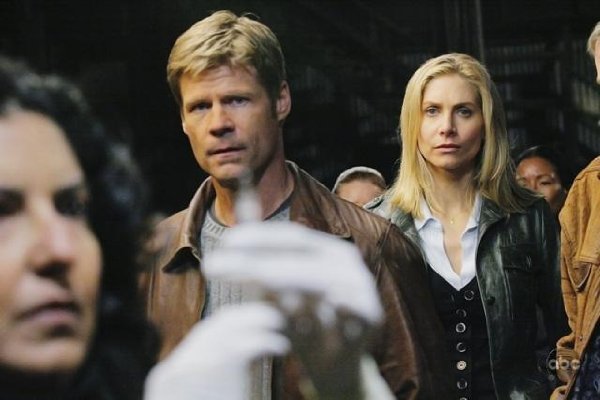 Your
father-in-law [William
Shatner of Star
Trek]
has certainly
had his share of genre television success as well. Did he give you
any advice early on about what it was like to be part of a hit
series?
Your
father-in-law [William
Shatner of Star
Trek]
has certainly
had his share of genre television success as well. Did he give you
any advice early on about what it was like to be part of a hit
series?
Ummm, the only
thing he probably would say was that it’s a grind. You have to
really find a balance in your life. I think not just him, everybody
says that when you’re doing a series. It can be all consuming.
This show, we are shooting in Vancouver. Having to travel back and
forth as much as I do, it gets tiresome. But, also, I’m one of
those actors that… I’m very grateful. I know a lot of wonderful
actors who are not working. I am very, very, very grateful to have
a job. And to be in a job that you love. So it’s just balance. He
always would mention balance. But, he was also like, “You’re
working? Great!” (laughs) He knows how hard it is to
work.
You just
mentioned that
V is filmed
in Vancouver. I believe The 4400 was, too. Do you ever
wonder if you are ever going to get a show out of LA?
Oh, boy, I
tell you, it would be nice to work out of LA. I mean, Vancouver is
a beautiful, beautiful city. It’s just not home. But it is a
beautiful, beautiful place. If I have to be somewhere, it’s a great
place to be. But, yeah, you always want to be by your family.
What would
people be surprised to know about you?
About me?
Ummm… (long pause) Hmmm… Boy. I’m extremely loyal. Almost
to a fault.
How would you
like for people to look back at your career?
He was a very
passionate actor who wasn’t afraid to take some risks. And
hopefully be wonderfully entertained. (laughs)
Are there any
misconceptions out there that you would like to clear up?
I’m not as bad
of a golfer as they might think.
Email
us Let us know what you
think.